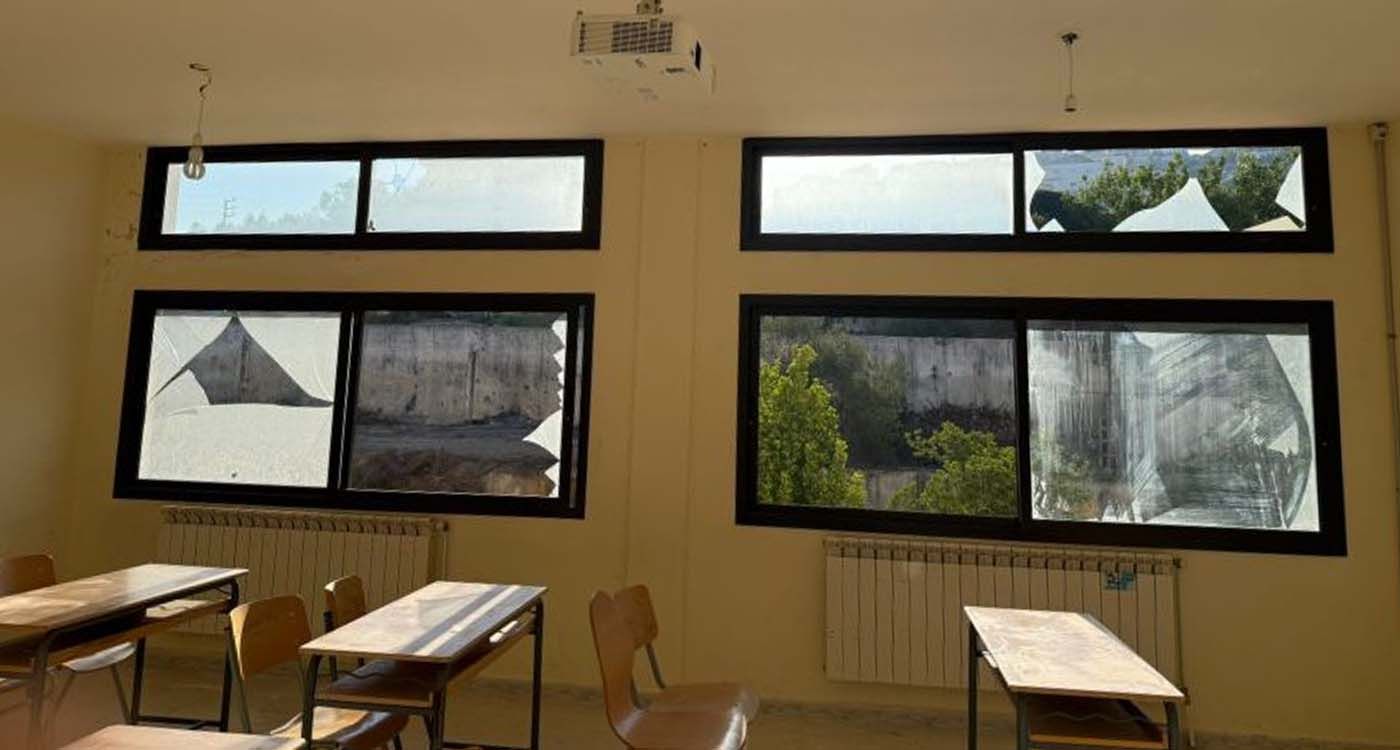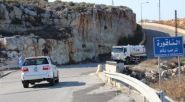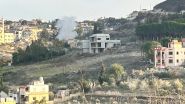
In a world where going to school is a basic right, stepping into a classroom in southern Lebanon requires courage. The 2025–2026 school year is far from being ordinary.
In the border villages of Taybeh, Mays al-Jabal, Rmeish, Khiam and Bint Jbeil, returning to classes feels like navigating through the remnants of recent conflict. Each lesson interrupted by the distant thud of an Israeli strike is a stark reminder of how precarious life remains.
After two years of online learning forced by war, students are coming back to classrooms with cracked walls, broken desks and the lingering echo of bombardments. The Ministry of Education recently reopened public schools near the border, ruling out online classes for this year.
Public and private schools in southern Lebanon continue to show the visible toll of the Israel-Hezbollah conflict. In Khiam, some classrooms still lack windows, with shattered panes replaced by plastic sheeting, raising serious concerns for the approaching winter. “We are missing many essential supplies,” says Mohammad Choker, principal of Khiam Public School.
Infrastructure is in poor shape: laboratories are gone, classrooms are damaged or unusable and sports facilities are wrecked. Some schools have repaired their buildings, while others, completely destroyed, have relocated to rented spaces nearby to accommodate students returning with their families.
At Mays al-Jabal, principal Faraj Badran expects prefabricated classrooms to arrive within ten days. “We ordered them to provide learning opportunities for children from around 500 families who have returned,” he explains.
Government attention appears limited, leaving private initiatives to fill the gap. The principal of Hula notes, “Efforts have been made to ensure destroyed schools do not remain closed. We are using two floors of the social aid center. The number of enrolled students has already exceeded 60.”
“Walking into these classrooms often means stepping over debris,” says Samir, a teacher in Mays al-Jabal. Cracked walls and crumbling infrastructure highlight the scarcity of resources for rebuilding. Schools, symbols of fragile hope, lack essential equipment: destroyed furniture, insufficient teaching materials, frequent power outages and limited access to clean water. Under these conditions, maintaining a normal learning environment is a daily struggle, directly affecting students’ safety, well-being and education.
Traumatized but Eager to Learn
After two years of disrupted online learning and forced displacements following Hezbollah’s decision to open a front with Israel on October 8, 2023, until the ceasefire agreement in November 2024, students in southern Lebanon face significant learning gaps. “My 10-year-old son still cannot read fluently. He lost two entire years,” says Hana, mother of three children from Bint Jbeil.
School dropouts are especially concerning for vulnerable children. Many have been forced to work to support their families. “My eldest son is 14. He has been working in a workshop since his father died,” recounts Soha, a displaced mother who recently returned to Khiam.
Students report feeling far behind despite schools reopening. “We try to keep up, but I feel behind in everything,” admits Nour, a secondary school student, emphasizing the urgent need to catch up after two years without regular classes.
Teachers face equally steep challenges. “I have students preparing for the Brevet, the national 9th grade exam, who can no longer write a simple essay. Two years away from school have left deep gaps: learning delays, dropouts and a loss of motivation,” says Zeina, a French teacher in Taybeh.
“Accelerated review sessions and mixed classes help,” says Hani, a math teacher, but rebuilding confidence is the toughest task. “Children have lost their rhythm, focus and enthusiasm,” notes Chadia, a school supervisor in Mays al-Jabal.
Psychological trauma compounds these challenges. “When I hear a noise outside, I jump. Even recess is stressful,” says Ramy, a student in Khiam. The slightest sound of a drone keeps students on constant alert. “Before teaching science or any subject, we must first calm their fears,” says the principal of Khiam’s school. “Here, education is not a luxury. It is a way to heal,” he concludes.
Teachers on the Frontline
Teaching in these villages is a daily act of courage. “I have never felt so anxious on the road,” says Fadia, a teacher at Bint Jbeil Public School.
Some teachers have been forced to leave their posts because the journey to school is too dangerous. “I had to cross two unstable areas to reach Taybeh. One day, a drone flew just a few meters from my car,” recalls Manale, a science teacher from Marjayoun. “I requested a transfer, but there were no other positions. I had to stop teaching. It was heartbreaking,” she adds.
The shortage of teachers in border areas worsens educational inequalities, leaving students in southern Lebanon, already traumatized by war, with even fewer opportunities.
Parents Torn Between Anxiety and Hope
Parents grapple not only with security fears, but also with the anxiety of failing to provide their children with a proper school year. “I hesitated until the last moment to send my children to school,” says Ahmad, a father of three in Hula, “but then I realized that depriving them of education would be another form of war.”
Some displaced families have made the courageous decision to return to their villages, specifically to allow their children to resume schooling. However, private schools remain largely inaccessible due to soaring tuition fees. “We can no longer afford the costs. I rely on precarious work, often disrupted by the security situation,” laments Najib, a construction worker in Taybeh.
Even public schools, often considered free, are costly in practice. In a fragile economy, school supplies have become a luxury. Backpacks, books and uniforms cost more than ever, adding to family stress.
Fortunately, local associations, international NGOs and the diaspora are helping, partially funding essential supplies. In markets across Khiam, Taybeh and Bint Jbeil, solidarity stands now provide much-needed support.



Comments